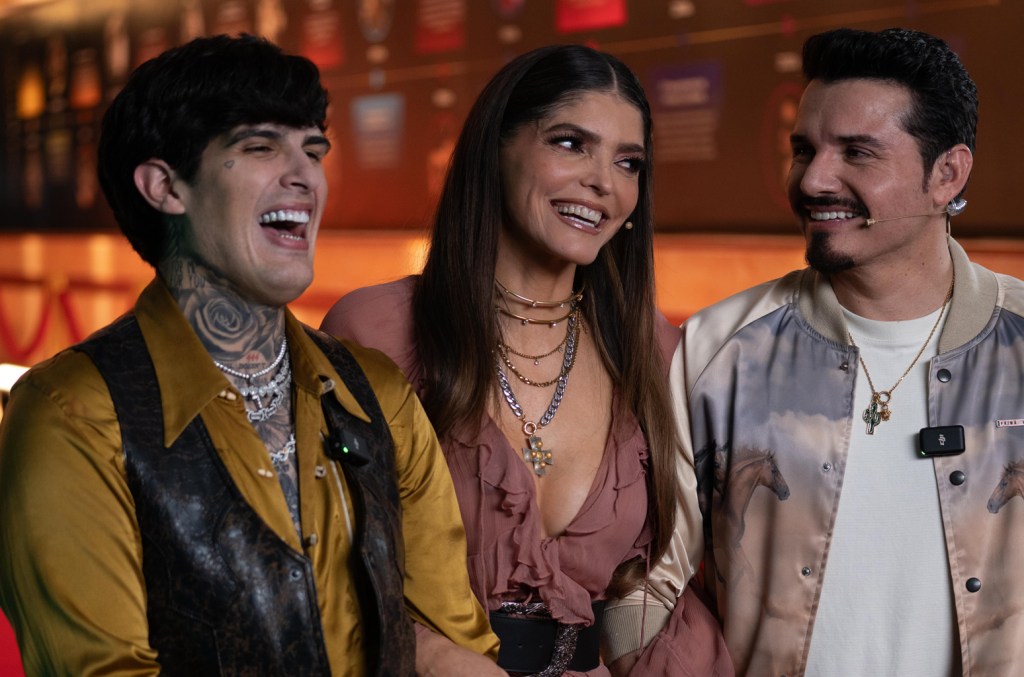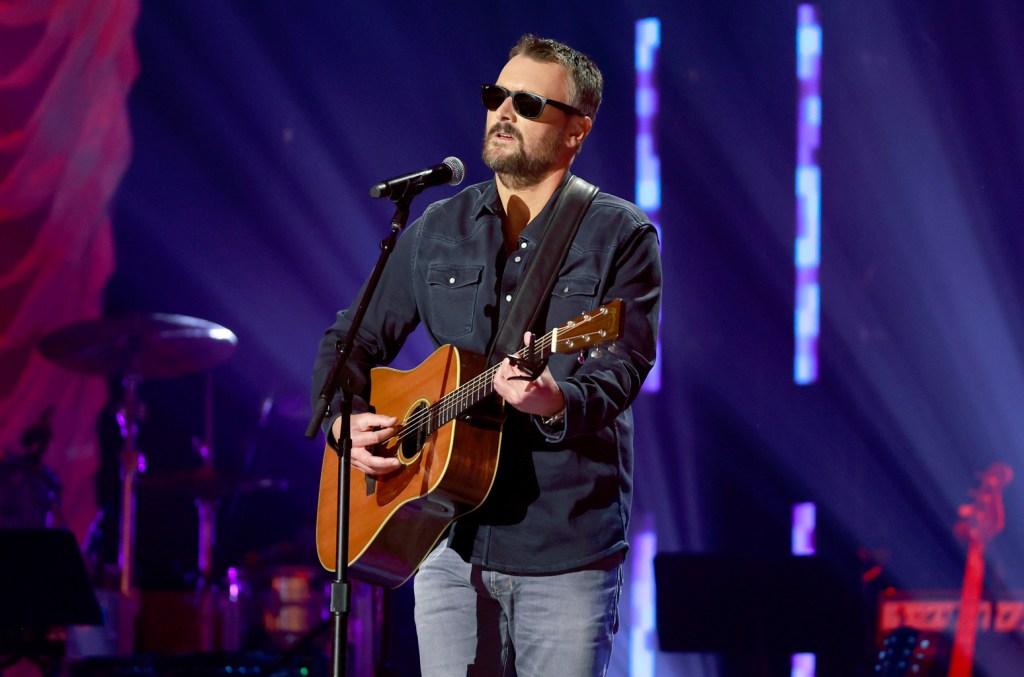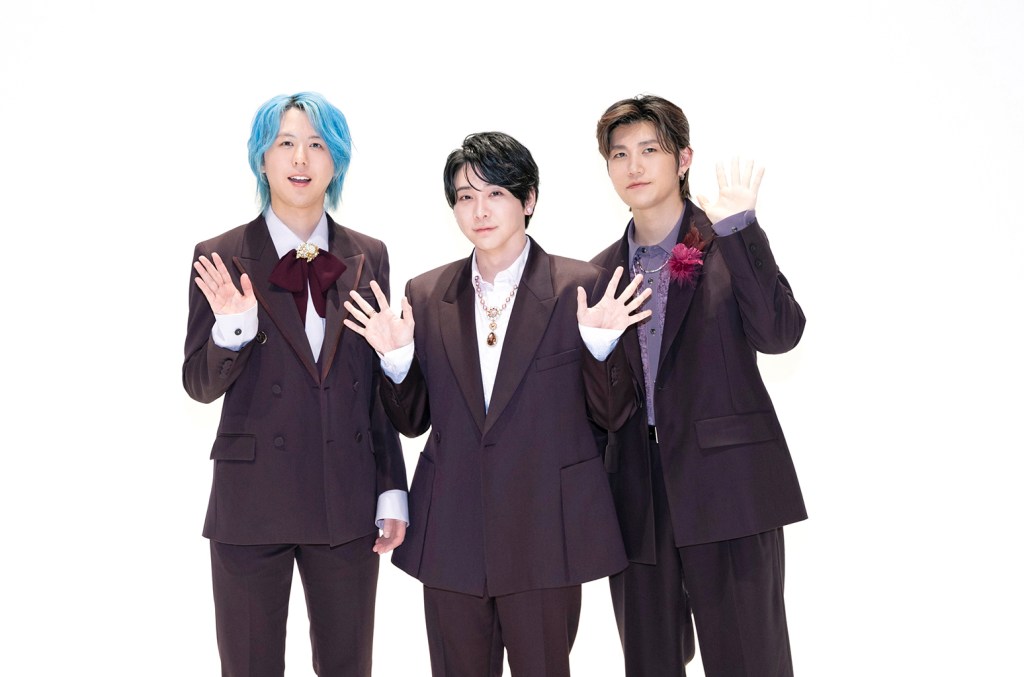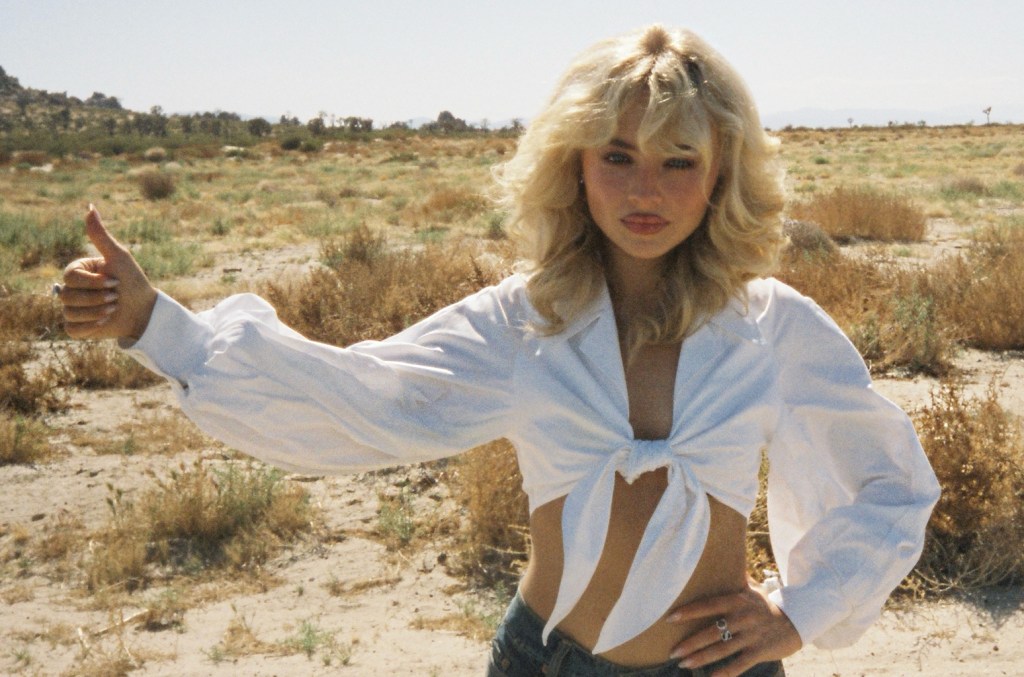Music
Page: 180
Billboard Japan unveiled its mid-year charts for 2025 early Friday morning (June 6), and Mrs. GREEN APPLE dominated the three major domestic rankings for the first time in the platform’s history: the all-genre Japan Hot 100 song chart, the Hot Albums tally, and the Artist 100 list compiled from the sum of the former two charts.
The three-man band’s songs old and new are loved by a wide audience, including the long-running hit “Lilac,” streamed approximately 270 million times during the mid-year tallying period. As they forge ahead with projects marking the tenth anniversary of their major-label debut, members Motoki Omori, Hiloto Wakai, and Ryoka Fujisawa shared their thoughts on the band’s monumental achievement during a packed schedule, repeatedly expressing their gratitude to everyone who listens to their music.
“Lilac” is the No. 1 song on Billboard Japan’s mid-year Japan Hot 100. Mrs. GREEN APPLE also remains atop the Artist 100 chart following your reign over the year-end list for 2024, and your album ANTENNA tops the Hot Albums tally for the first time. Congratulations! How do you feel about this unprecedented accomplishment?
Trending on Billboard
Motoki Omori (vocals, guitar): I’m thrilled. I also feel humbled, but the fact that so many people are listening to our music just makes me so happy. I’d like to continue making music sincerely from now on as well. Thank you.
Hiloto Wakai (guitar): It makes me really happy to know that our music is reaching so many people in this way. “Lilac” is a song from last year, and since we aim to make songs that will be loved for a long time, it’s very gratifying. Thank you.
Ryoka Fujisawa (keyboards): Mrs. GREEN APPLE is celebrating its tenth anniversary since its debut this year. From the time we formed the band, we’ve continued to place importance on putting out the music that Omori writes, so I feel very happy and grateful that it’s being listened to by many and appreciated like this. Thank you.
And Mr. Omori, you’re on your way to becoming the Top Lyricist and Top Composer for the third year straight, after topping the mid-year results for 2025. In addition to “Lilac,” “Bitter Vacances,” “Que Sera Sera,” “Darling,” and “Soranji” are also charting in the top 10, proving that many listeners are inspired by your words, and the melodies that create the world of your songs.
Omori: You know what, I’m just really pleased to hear such kind words from each person and also about the fact that our songs are blending into everyday life and adding color to it. Like, “I danced to your song on our school’s sports day,” or “It was playing at such-and-such a place,” for example. I still find it hard to believe that my music has become a part of people’s everyday lives, but it really gives me joy. Writing music is a necessity in my life, not just something I enjoy doing. It’s something very important for me to be able to live my life as who I am, so I feel really fortunate that the recognition meshes properly with that and am grateful for it.
You’ve had many opportunities to do solo work in addition to working as a band. Do you feel that you’ve grown from those experiences?
Wakai: I’ve done solo work before, but used to always be like, “What if I mess up?” and sometimes things didn’t go well. But now that I’m being tapped to work as an individual on more occasions, I’m starting to gradually enjoy myself more, so that feels like proof that I’m growing as a person.
Omori: I’ve had more opportunities to do acting, and it’s the first time in four years that I’ve done any solo work. I feel very reassured by the magnitude of our band and the fact that Wakai and Fujisawa are protecting it as my allies. I’m able to lean on them now, and that feels like personal growth, or that time has passed. I’m truly grateful to both of them.
Fujisawa: I’ve been watching Omori and Wakai working hard on their solo endeavors and like them, I’m determined to do my best representing our band, but I don’t think I’m in a position to speak of such ambitions yet. When I’m working on my own, it really hits home how important Omori and Wakai are to me. Like the things they say, or words of encouragement they give me when we’re working together. I really appreciate that kind of casual, everyday communication. Every day I realize how grateful I am that they’re there.
The tenth anniversary of your debut, as well as your anniversary concerts and dome tour are coming up. What do you think are the highlights and things to look out for in these events for fans looking forward to them?
Omori: I think the best way to experience the latest Mrs. GREEN APPLE is at one of our live shows, so I hope everyone will enjoy our energy to the fullest. I’m just looking forward to meeting many people. I want to express my gratitude directly to the people who support us so much, so I hope we’ll have more opportunities to do so. Everything is going to be fun, so I really hope people will enjoy it from the bottom of their hearts without hesitation. That’s all I can say.
Wakai: There are some songs we haven’t performed live yet, so I hope people have fun waiting to see if they’ll be played or not. We’re all excited getting prepared, so let’s go full-out and create some fun memories together! Looking forward to seeing everyone there!
Fujisawa: This year is our MGA MAGICAL 10 YEARS celebration, and we intend to unleash lots of things that everyone will enjoy. As the other two said, we’re really looking forward to meeting everyone, and more than anything, we’re grateful to be able to celebrate the tenth anniversary of our major-label debut in this way. All we feel is gratitude, and I hope everyone is really, really looking forward to it!
–This interview by Mariko Ikitake first appeared on Billboard Japan
Samuel L. Jackson didn’t exactly know what he was getting into when he first agreed to be a part of Kendrick Lamar‘s Super Bowl Halftime Show. The veteran actor and civil rights activist stopped by the Mad Sad Bad podcast and talked about his turn as Uncle Sam during the Super Bowl earlier this year, […]
Mrs. GREEN APPLE dominates Billboard Japan’s mid-year domestic charts for 2025, rounding up the weeks from Nov. 25, 2024 through May 25, 2025.
On the Japan Hot 100 song chart, the three-man band’s “Lilac” leads the list for the first half of the year. “Lilac” was released on April 12, 2024, and featured as the opening theme song for the anime show Oblivion Battery. The track became a long-running hit, topping the Japan Hot 100 five times during the tallying period for the 2025 mid-year chart.
Rosé & Bruno Mars’ “APT.” follows at No. 2. The global hit led the Japan Hot 100 on the chart released Nov. 20, becoming the first song by a Western act to hit No. 1 on the tally in about eleven and a half years, since The Wanted’s “Glad You Came” in May 2013.
Explore
Explore
See latest videos, charts and news
See latest videos, charts and news
At No. 3 is Mrs. GREEN APPLE’s “Bitter Vacances.” The theme song for the live-action movie Saint Young Men became the third-fastest song to rack up 100 million streams for the band. Four songs by the hitmakers have charted in the mid-year top five, the first time any act has accomplished this feat.
Trending on Billboard
Frontman and principal songwriter Motoki Omori comments, “I’m thrilled. I also feel humbled, but the fact that so many people are listening to our music just makes me so happy. I’d like to continue making music sincerely from now on as well. Thank you.” Guitarist Hiloto Wakai says, “It makes me really happy to know that our music is reaching so many people in this way. ‘Lilac’ is a song from last year, and since we aim to make songs that will be loved for a long time, it’s very gratifying. Thank you.” Keyboardist Ryoka Fujisawa notes, “Mrs. GREEN APPLE is celebrating its tenth anniversary since its debut this year. From the time we formed the band, we’ve continued to place importance on putting out the music that Omori writes, so I feel very happy and grateful that it’s being listened to by many and appreciated like this. Thank you.”
Mrs. GREEN APPLE also rules the mid-year Hot Albums chart, with its fifth studio set ANTENNA leading the list. The project dropped on July 5, 2023 and came in at No. 1 for streaming and No. 7 for downloads during the 2025 mid-year tallying period.
Snow Man’s best-of album THE BEST 2020 – 2025 follows at No. 2. The collection by the nine-member group sold 1,616,736 copies during the tallying period and topped the album sales chart. SixTONES’ fifth album GOLD is at No. 3. All of the sextet’s albums, including this one, has hit No. 1 on the Hot Albums tally.
And Mrs. GREEN APPLE rounds out the mid-year trifecta as the top artist on the Japan Artist 100 chart, compiled from the results of the Japan Hot 100 and Hot Albums charts. 20 songs by the “Darling” hitmakers have charted in the mid-year top 100.
back number follows at No. 2. The veteran three-man band’s latest hit is “Blue Amber,” being featured as the theme song of a currently ongoing drama series. At No. 3 is singer-songwriter Vaundy, who has five songs including “Kaiju no Hanauta” and “Fuujin” charting in the top 100.
The globalization of music has been gaining momentum in recent years, with Japanese artists performing overseas more proactively and a brand-new international music award, MUSIC AWARDS JAPAN, launching this year. On Billboard Japan’s Global Japan Songs Excl. Japan chart that tallies songs from the country that are popular abroad, Creepy Nuts’ “Otonoke” rules the mid-year round-up. The Dandadan opener has become a global hit following the rap duo’s breakout smash “Bling-Bang-Bang-Born.” “Otonoke” also topped the country and region specific Japan Songs rankings in six countries and regions, tallying the weeks from Nov. 22, 2024 through May 22, 2025.
“‘Otonoke’ has topped the mid-year Global Japan Songs excl. Japan chart for 2025, a ranking of songs from our country that are being listened to globally. Thank you so much!” comment Creepy Nuts. “We’re really proud of ‘Otonoke,’ so we’re glad to know so many people from around the world are enjoying it. We also look forward to being able to visit the countries where our songs are being listened to and perform live there. Thank you for your continued support!”
Billboard Japan Hot 100 Mid-Year Chart 2025
1. “Lilac” / Mrs. GREEN APPLE
2. “APT.” / Rosé & Bruno Mars
3. “Bitter Vacances” / Mrs. GREEN APPLE
4. “Que Sera Sera” / Mrs. GREEN APPLE
5. “Darling” / Mrs. GREEN APPLE
6. “Soranji” / Mrs. GREEN APPLE
7. “Otonoke” / Creepy Nuts
8. “Kawaii Dakeja Dame Desuka?” / CUTIE STREET
9. “IKUOKUKONEN” / Omoinotake
10. “Bling-Bang-Bang-Born” / Creepy Nuts
Billboard Japan Hot Albums Mid-Year Chart 2025
1. ANTENNA / Mrs. GREEN APPLE
2. THE BEST 2020 – 2025 / Snow Man
3. Attitude / Mrs. GREEN APPLE
4. strobo / Vaundy
5. No.Ⅰ / Number_i
6. replica / Vaundy
7. Rosie / Rosé
8. Hello! We’re timelesz / timelesz
9. LOST CORNER / Kenshi Yonezu
10. BAD HOP / BAD HOP
Billboard Japan Artist 100 Mid-Year Chart 2025
1. Mrs. GREEN APPLE
2. back number
3. Vaundy
4. Kenshi Yonezu
5. Official HIGE DANdism
6. YOASOBI
7. Aimyon
8. Creepy Nuts
9. Snow Man
10. CHANMINA
Billboard Japan Global Japan Songs Excl. Japan Mid-Year Chart 2025
1. “Otonoke” / Creepy Nuts
2. “Bling-Bang-Bang-Born” / Creepy Nuts
3. “Idol” / YOASOBI
4. “Shinunoga E-Wa” / Fujii Kaze
5. “ReawakeR (feat. Felix of Stray Kids)” / LiSA
6. “TOKYO DRIFT (FAST & FURIOUS)” / TERIYAKI BOYZ
7. “Mayonaka no Door – Stay With Me” / Miki Matsubara
8. “It’s Going Down Now” / Lotus Juice/Azumi Takahashi
9. “NIGHT DANCER” / imase
10. “Racing into the Night” / YOASOBI
The first week of June is ending with an impressive variety of major music releases, with hitmakers such as Sabrina Carpenter, Mariah Carey and Ed Sheeran all dropping new tracks. Both S.C. and M.C. released songs dedicated to the types of partners they’re attracted to, but with decisively different attitudes. Marking her first piece of […]
Over the past two-ish years, BLINKs have definitely missed seeing their favorite lovesick girls together. But this summer, the ladies of BLACKPINK will finally be a unit once more, with ROSÉ, LISA, JENNIE and JISOO set to return with a world tour and new music after taking time off to pursue solo projects. And, much […]
Beyoncé suffered a wardrobe malfunction during her Cowboy Carter Tour on Thursday night (June 5), but not even having her pants fall down on stage can ruffle Queen Bey’s feathers. Explore Explore See latest videos, charts and news See latest videos, charts and news According to footage posted by attendees on social media, the mishap […]

Pase a la Fama, Telemundo’s new television series, is set to premiere on Sunday, June 8 featuring a star-studded panel of judges — Ana Bárbara, Adriel Favela and Horacio Palencia — and original music produced by Latin Grammy-winning hitmaker Edgar Barrera.
During the show, participants will compete in a bootcamp-like setting where they will “train, perform and face challenges,” according to a press statement, vying for a $100,000 prize, a record deal with HYBE Latin America and crowned the next regional Mexican band, which will comprised of five participants.
Trending on Billboard
“The truth is that it’s a project we put our hearts into,” Ana Bárbara tells Billboard during a conversation over Zoom, just days before competition kick off. “I personally feel moved, excited, thrilled and I think it will be a great project.”
The judges will be meticulous about who they choose as finalists. They must have “discipline and respect for the audience and us as judges, all of those are ingredients that for me are very, very important,” Palencia says. “In fact, I tell the new generation that, for me, discipline is actually even more important than talent, because sometimes it doesn’t matter to have talent if you don’t have discipline.”
So, what were the main qualities the judges looked for?
“It’s a band and, at the end of the day, I believe that there are many components that contribute to what brings success to a career,” Palencia adds. “The [right] attitude, preparation and how they accept more than just criticism, but the constructive advice we give them,” Palencia adds. “I believe that the winning band will genuinely work towards achieving all of those characteristics.”
The show is set to premiere at a time when some música mexicana artists are facing bans in Mexico (if they sing narcocorridos in certain public settings) or visa delays and revocations in the United States. “I had no idea that all of this could happen, which is both delicate and strong, yet sensitive, and definitely very sad,” Ana Bárbara says. “Because it affects all of us in some way, it has an impact. We all admire the music of someone who is having problems for various reasons, beyond whatever the reason may be. This show will provide [Mexican] music with a different level of visibility.”
The judges will also focus on emphasizing “clean song lyrics and about love stories,” Favela says. “It is nice to realize that music is giving us a chance to go beyond the musical aspect. To see our individual values, to see young people singing themes that, nowadays, I dare to say, are being lost, perhaps more and more. And that there is validity in rescuing all of this, which at the end of the day is the pure root of our Mexican essence.”
It was previously announced that Lupillo Rivera, Fuerza Regida’s JOP and Gabito Ballestero’s will join the show as mentors. The first episode of Pase a la Fama will premiere Sunday at 9 p.m. ET on Telemundo.
The Funeral Portrait goes 2-for-2 atop Billboard’s Mainstream Rock Airplay chart, lifting to No. 1 on the June 14-dated survey with “Holy Water.”
The track, which features Five Finger Death Punch vocalist Ivan Moody, is the band’s second Mainstream Rock Airplay ruler in as many entries, following the one-week reign of “Suffocate City,” featuring Ice Nine Kills’ Spencer Charnas, last November.
This time around, The Funeral Portrait’s trip to No. 1 is one week quicker; “Holy Water” rules in its 18th frame on the chart.
Explore
Explore
See latest videos, charts and news
See latest videos, charts and news
Moody reaches No. 1 on Mainstream Rock Airplay as a solo act for the first time, having exceeded his No. 10 peak as a featured vocalist on Cory Marks’ “Outlaws & Outsiders,” alongside Travis Tritt and Mick Mars, in 2020. Five Finger Death Punch, with him as frontman, boasts 15 leaders, third-most dating to the ranking’s March 1981 inception.
Trending on Billboard
Concurrently, “Holy Water” places at No. 11 on the all-rock-format, audience-based Rock & Alternative Airplay chart with 2.5 million audience impressions, up 8%, in the week ending June 5, according to Luminate. The song reached a No. 8 high a week earlier and marks The Funeral Portrait’s first top 10 on the tally, having passed the No. 11 best of “Suffocate City.”
“Holy Water” is the second single from The Funeral Portrait’s 2024 album Greetings From Suffocate City. Released in September, the set has earned 25,000 equivalent album units to date. The collection is the second full-length from the group, which formed in Atlanta more than a decade ago.
All Billboard charts dated June 14 will update Tuesday, June 10.

Eric Church looked back on his unexpected involvement in the lawsuit over Taylor Swift‘s hit single “Shake It Off” in a new interview.
Back in 2017, the superstar got hit with allegations of copyright infringement by Sean Hall and Nathan Butler, the songwriters behind 3LW’s 2001 single “Playas Gon’ Play.”
“In her deposition, when [talking about the line] ‘players gonna play, haters gonna hate,’ she says, ‘The first time I heard that phrase was in Eric Church’s song ‘The Outsiders,’” the country singer explained in a sit-down with Rolling Stone published Friday (June 6). “She was saying she never heard it on [the 3LW song], which is what they were suing her for. And two weeks later, I got served by the people that were suing her!”
According to Church, getting slapped with his own legal papers prompted him to reach out to Swift via text. “I was like, ‘Hey, thanks. Next time, let’s just skip that part?’” he said. “And she sent me a text: ‘I’m sorry. It’s the truth, though. That’s when I heard that phrase.’”
Trending on Billboard
“It’s since been settled,” Church added of his own involvement. However, the “Hands of Time” singer concluded in the interview that the whole experience still had him wondering, “‘How did this even happen?’”
Since an agreement to drop the “Shake It Off” lawsuit was reached between Swift, Hall and Butler in late 2022, Church has released his eighth studio album, 2025’s Evangeline vs. the Machine, which he’ll be promoting this fall with his upcoming Free the Machine Tour.
More recently, Church also collaborated with Morgan Wallen on I’m the Problem album cut “Number 3 and Number 7,” and in the same Rolling Stone interview, defended Bruce Springsteen after the namesake of his hit 2011 single “Springsteen” criticized President Trump and his administration during a concert.
This week in dance music: deadmau5 and Rezz graced the cover of Billboard Canada, talking about their longstanding collaboratove project, Rezzmau5. In the story deadmau5 also spoke about selling his catalog to Create Music Group earlier this year, saying that “it was time to just let it go.” Elsewhere, Italian techno producer Deborah de Luca […]

 State Champ Radio
State Champ Radio 




